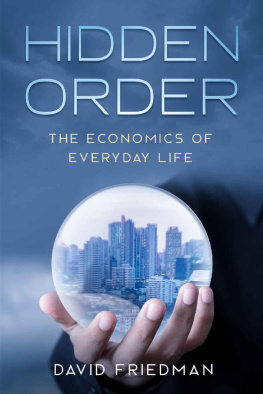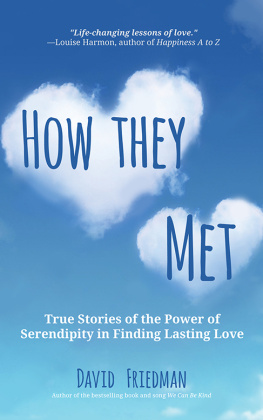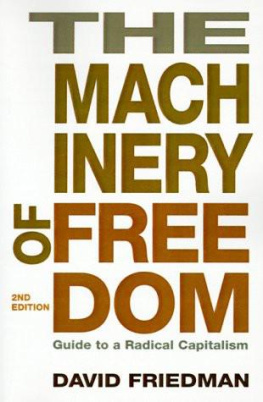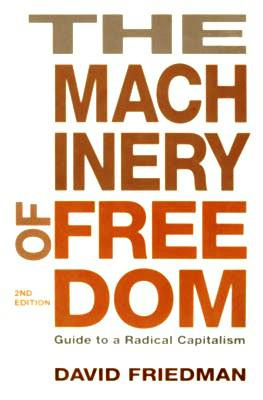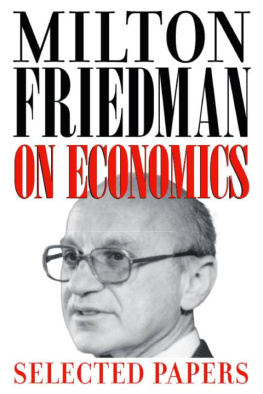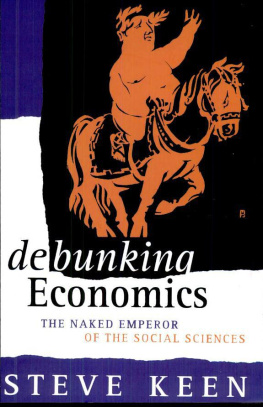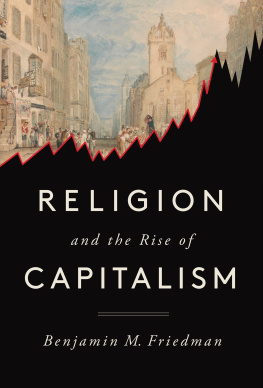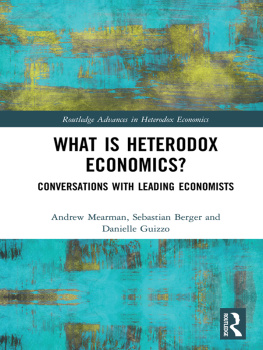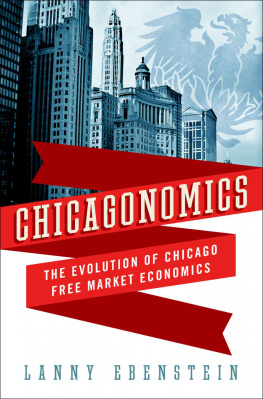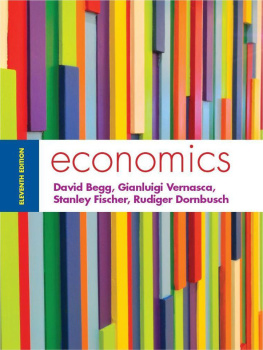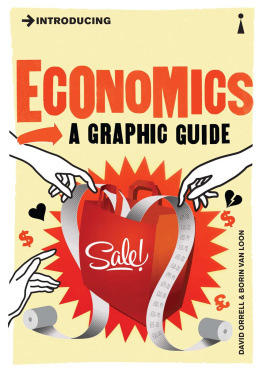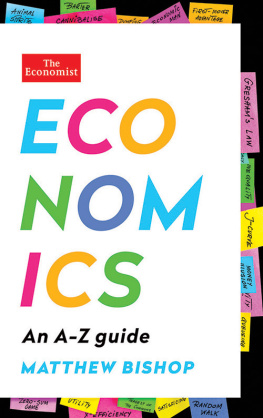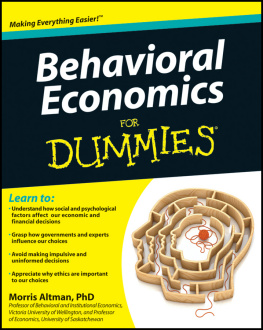Hidden Order
The economics of everyday life
David D. Friedman
Second Edition
1996, 2019 David D. Friedman
Cover and hero cartoon by Anna Krupitsky
Other Work by David Friedman
Non-fiction
The Machinery of Freedom: Guide to a Radical Capitalism
Price Theory: an Intermediate Text
Laws Order: What Economics Has to Do With Law and Why It Matters
Future Imperfect: Technology and Freedom in an Uncertain World
Legal Systems Very Different from Ours
A Miscellany (with Elizabeth Cook)
How to Milk an Almond, Stuff an Egg, and Armor a Turnip: A Thousand Years of Recipes (with Elizabeth Cook)
Fiction
Harald
Salamander
Brothers (forthcoming)
Web Page
Blog
This book is dedicated to:
My parents for early lessons in rationality,
Julius Margolis and James Buchanan for
getting me into this business,
and my co-conspirators living and dead,
the colleagues from whom I have learned:
Adam Smith
David Ricardo
Alfred Marshall
Harold Hotelling
George Stigler
Ronald Coase
Thomas Schelling
Gordon Tullock
Gary Becker
Robert Frank
John Von Neumann
Jack Hirschleifer
Earl Thompson
Howard Demsetz
Yew-Kwang Ng
Lawrence Iannaccone
Harold Margolis
Stephen Landsburg
Robin Hanson
And to Lynn Chu, for the best editorial advice I have ever gotten.
Contents
: Economics for Pleasure and profit
: Price=Value=Cost: Solving a simple economy
: in search of the real world
: standing in for moral philosophy: the economist as judge
: applications: conventional and un
Forward
To know David Friedman is to fully grasp the meaning of "infectious enthusiasm . " There is no such thing as a casual encounter with this man. Pass him on the street and he'll stop to explain what's wrong with our tort system, or why farmers have more political clout than grocers, or how to design a Doomsday Machine, or Friedman's Law for how to find the men's room. Take him to lunch and you'll learn why there are s o many religious broadcasters, the principles of medieval Icelandic criminal justice, and how to keep your home safe from burglars.
Now, people who teem with ideas are a dime a dozen. Usually, we call them crackpots. But disciplined thinkers who teem with ideas are rare and precious. And a disciplined thinker who can express his ideas w ith clarity and wit is a national treasure. Meet David Friedman.
The discipline at the core of David's thought is that of economic theory. Everything he says is a rigorous application of the fundamental principles of economics . Indeed, his thinking is so thoroughl y intertwined with economics that one book can serve simultaneously as an introduction to mainstream economic theory and an introduction to the extraordinary mind of David Friedman. This is that book.
And it's high time for it. My local chain bookstore carries over tw o dozen popularizations of physics, but only one popularization of economics. As it happens, that book is called The Armchair Economist, and I wrote it. Writing that book taught me this: To make economics b oth clear and entertaining, one ought to quote liberally from the w ritings and conversations of David Friedman . David's name a ppears in my book more than any other economist's.
Now readers have an opportunity to experience David Friedman fir sthand. Don't let me delay you any longer. Go for it. Prepare to be e xhilarated.
Steve Landsburg
Introduction
Thirty-three years ago, I published a price theory textbook and gave a copy to my favorite aunt. She passed it on to her son. He passed it on to his daughter. She lent it to her fianc. He, I was told, entertained the family at breakfast with readings from it. I concluded that I should rewrite my textbook as an explanation of economics designed to be read for the fun of it.
That is this book.
You will see some very odd things in it, including discussions of war, love, marriage, virtue, and vice . All of it is economics. One of the oddest things, Gary Becker's Rotten Kid Theorem, which tells us when a rational child will or will not find it in his interest to kick his sister, was part of an important piece of theoretical work b y one of the world's leading economists. The discussion of the eco n omics of virtue and vice is in part original with me, in part lifted from a book by Robert Frank, a man who can fill a room at the national economics meetings, where they run fifty sessions at a time.
This is economics as many economists I am tempted to say all good economists see it: a blend of theory, intuition, real world puzzles and ingenious, if sometimes bizarre, solutions. Not a way of predicting the GNP but a powerful engine for understanding behavior, principally human behavior but with applications to genes, computers, and animals as well.
We start with a single assumption, rationality, and with it set out to conquer the world.
David Friedman
Professor Emeritus, School of Law, Santa Clara University
http:/ /www.daviddfriedman.com
Section I
Economics for
Pleasure and Profit
1: Rush Hour Blues and Rational Babies
To most people, economics is a dull science full of statistics and jargon, mainly concerned with money and designed to answer a narrow (but important) set of questions. To economists, economics is a powerful tool for understanding why armies run away, voters are ignorant and divorce rates rise, as well as solving practical problems such as how not to get mugged. Its theme is not money but reason the implications, especially the non-obvious implications, of the fact that humans act rationally. To put it more formally:
Economics is that way of understanding behavior that starts from the assumption that individuals have objectives and tend to choose the correct way to achieve them.
Economic rationality summons up an image of a cold-blooded calculator, perhaps Mr. Spock. But economics is not just for Vulcans; the assumption describes our actions, not our thoughts. If you had to understand something intellectually in order to do it, none of us would be able to walk, as became clear when people started trying to program robot walkers. We learn, not through logic alone, but by a complicated process of feel, feedback, and intuition.
There are lots of ways to behave rationally without reasoning your way to it. Whether or not you have logically deduced that in order to live you must eat, if you dont eat you wont be around long to have your behavior analyzed by economists. So evolution is one source of rational behavior. Trial and error is another. I have never run a map of Santa Clara County through my computer, but I think I know the shortest way home from my office.
For a familiar example of rational behavior without reasoning, consider the situation of an infant, with only one tool available for achieving his objectives. When he is hungry or wet, he makes loud and unpleasant noises, giving any adults in the vicinity an incentive to deal with the problem. I doubt that babies think through the logic of their situation but they take the action most likely to achieve their ends.
Babies are rational. So are cats. If you insist on reading the newspaper when you should be petting your cat, the cat solves the problem by lying down on the paper. I do not know if that tactic is the product of calculation or trial and error, but it works.
In order to get very far with economics, one must assume not only that people have objectives but that their objectives are reasonably simple. Without that assumption, economics becomes an empty theory; any behavior, however peculiar, can be explained by assuming that the behavior itself was the objective. (Why did I stand on my head on the table while holding a burning $1,000 bill between my toes? I wanted to stand on my head on the table while holding a burning $1,000 bill between my toes.)

